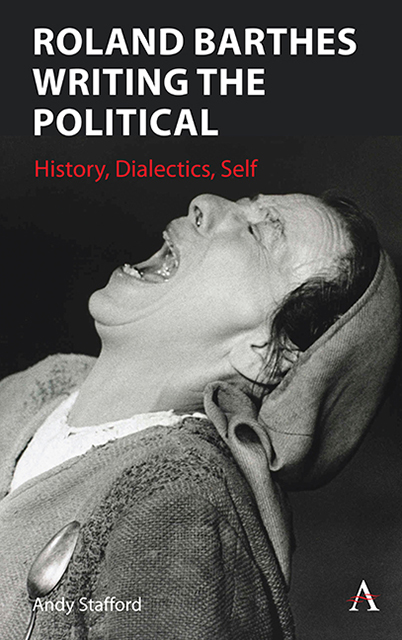Book contents
- Frontmatter
- Contents
- Acknowledgements
- Foreword
- Chapter One ‘The Dialectical Logic of Love’
- Chapter Two ‘Amorous Dialectic’
- Chapter Three ‘The People Chorus’
- Chapter Four ‘Double Grasp’
- Chapter Five ‘Stereographic Space’
- Chapter Six ‘Non-Classifiable’
- Chapter Seven ‘New Dialectic’
- Chapter Eight ‘Opacity’
- Chapter Nine ‘Undialectics’
- Afterword: Essayism and the Politics of Writing
- Bibliography
- Index
Chapter Seven - ‘New Dialectic’
Published online by Cambridge University Press: 08 June 2023
- Frontmatter
- Contents
- Acknowledgements
- Foreword
- Chapter One ‘The Dialectical Logic of Love’
- Chapter Two ‘Amorous Dialectic’
- Chapter Three ‘The People Chorus’
- Chapter Four ‘Double Grasp’
- Chapter Five ‘Stereographic Space’
- Chapter Six ‘Non-Classifiable’
- Chapter Seven ‘New Dialectic’
- Chapter Eight ‘Opacity’
- Chapter Nine ‘Undialectics’
- Afterword: Essayism and the Politics of Writing
- Bibliography
- Index
Summary
It was C. L. R. James who famously claimed, in a letter to John O’Neill, that he had managed to understand the dialectic in action: ‘I take the liberty of sending you a work of my own … a study of the dialectic of Hegel, not explanations of the dialectic but directly the dialectic itself … I regret to say that it is the only direct study of the dialectic that I know’ (cited in Dunayevskaya 1972, n1). It is precisely the writing of the dialectic that we trace in Barthes's accounts of his trips to Japan and then China.
Throughout the 1960s and into the early 1970s, Barthes is looking for a dialectical way of writing. In three separate essays – ‘Authors and Writers’ in 1960, in a 1965 article on Edgar Morin's ‘dialectical writing’, and ‘Writers, Teachers, Intellectuals’ in 1971 – he comes to the same conclusion. It is worth quoting in full the footnote in ‘Authors and Writers’, to show the view of the non-dialectical nature of language:
Structure of reality and structure of language: no better indication of the difficulty of a coincidence between the two than the constant failure of the dialectic, once it becomes discourse: for language is not dialectic, it can only say: ‘we must be dialectical [il faut être dialectique]’, but it cannot be so itself: language is a representation without perspective, except precisely for the author’s; but the author dialecticizes themself, they do not dialecticize the world. (1972, 146n3, trans. mod.)
Despite the injunction for the responsible intellectual ‘we must be dialectical’, language itself is incapable of being dialectical because, he argued, it is ‘monodic and linear’: it can speak of more than one phenomenon not at once but only in series. ‘La dialectique parlée’ – in a sentence which is, inexplicably, left out of the English translation – ‘est un voeu pieux’ [the spoken dialectic is wishful thinking] (2002, II, 405n2).
The danger is that we consider this turning away from the world to the self as one of antipathy to politics. Indeed, the ‘new dialectic’ that Barthes finds in Japan should not be seen, however, as a harbinger of so-called ‘postmodernity’.
- Type
- Chapter
- Information
- Roland Barthes Writing the PoliticalHistory, Dialectics, Self, pp. 145 - 168Publisher: Anthem PressPrint publication year: 2022



